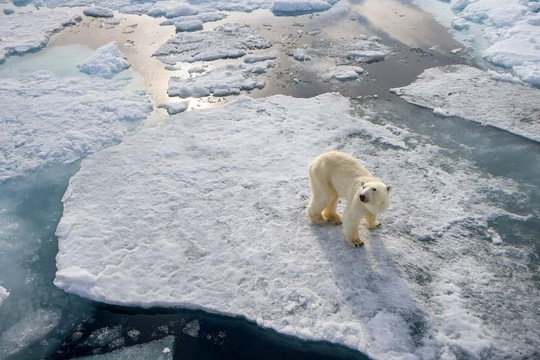The loss of Arctic sea ice is “not the only sign of growing cryosphere collapse”, according to the State of the Cryosphere report, which has been released by a group of scientists at the start of the United Nations’ Cop27 climate talks in Egypt.
The climate crisis has pushed the planet’s stores of ice to a widespread collapse that was “unthinkable just a decade ago”, with Arctic sea ice certain to vanish in summers and ruinous sea level rise from melting glaciers now already in motion, a major new report has warned.
Even if planet-heating emissions are radically cut, the world’s vast ice sheets at the poles will continue to melt away for hundreds of years, causing up to three metres of sea level rise that will imperil coastal cities, the report states.
The “terminal” loss of sea ice from the Arctic during summers could arrive within a decade and now cannot be avoided, it adds.
“There’s nothing we can do about that now. We’ve just screwed up and let the system warm too much already,” said Julie Brigham-Grette, a scientist at University of Massachusetts Amherst and report co-author, about the sea ice.
“That milestone has now passed so the next thing we need to avoid is ice shelf collapses in Antarctica and the further breakdown of the ice systems in Greenland. We can’t stuff the genie back into the bottle once they are gone.”
Disappearance of sea ice will open up the dark Arctic ocean, which will absorb – rather than reflect – heat, causing global heating to escalate further. It will also upend the region’s ecosystem, harming everything from algae to large animals such as seals and polar bears that need the sea ice for hunting.
“It’s a terminal diagnosis and now we have to live with consequences,” said Robbie Mallett, a sea ice expert at University College London Earth Sciences.
A huge amount of sea level rise appears to be already locked in due to the rampant burning of fossil fuels, the report states, with sections of the west Antarctic ice sheet potentially collapsing even without any further emissions over the coming centuries, causing more than four metres of additional sea level rise. Greenland’s ice loss has already committed around 30cm to sea level rise.
“The costs to places like Florida and Bangladesh and the Nile delta are just enormous, it’s going to be a huge strain,” said Brigham-Grette.
The Arctic is heating up around four times as quickly as the global average, which, combined with record heatwaves in Antarctica, risks a rapid “meltwater pulse” not seen at any time in the past 130,000 years, during which time human civilization has developed. This surge in water could prove disastrous for coastal areas.
Meanwhile, glaciers in places such as the Himalayas and the Andes are winnowing away, risking the drinking water supplies of tens of millions of people and, conversely, raising the threat of disastrous flooding.
“Rapid decarbonization is absolutely essential, it’s a moral obligation to the future,” Brigham-Grette said. “If we don’t accept that moral responsibility we aren’t going to be very good ancestors, we won’t be looked upon fondly. It will be a human tragedy.”
Brigham-Grette said even worse impacts can still be averted by reduced emissions, however, and urged governments gathered at Cop27 to do more to save the world’s bodies of ice.
read more in our Telegram-channel https://t.me/The_International_Affairs

 10:58 13.11.2022 •
10:58 13.11.2022 •























